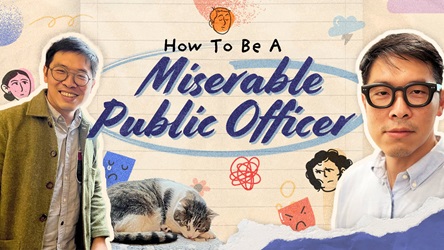Take Time To Reflect by Koh Lin-Net
Ministry of Trade and Industry

I am often asked what my advice would be for young officers, and the first thought that always comes to mind is, be patient.
I’m fortunate to have worked with many exceptional young individuals who had impressed me with their drive, resourcefulness and quickness of mind. But on occasion, I’m also saddened that some of them, who hold so much promise, are simply too impatient to be noticed. They worry about whether their efforts are appreciated or whether they are getting promoted faster than others. They worry so much, it backfires on them. If you approach the job thinking, “If I do it this way, I will get noticed”, it will likely result in a sub-optimal job. Focus on doing a good job and recognition will follow. If it doesn’t, ask yourself if it could have been done better. It probably could have been.

I’ve sat through the patience lesson myself. In my first job at a statutory board, I was tasked to research the local logistics sector. It being my first assignment, I was very excited. I called up all sorts of statistics, met with lots of companies, and spent many weekends and public holidays in the office. Finally I submitted the paper, and waited anxiously for feedback and the implementation of my recommendations. Although my boss was kind enough to spend some time discussing the paper with me, it didn’t get anywhere beyond him. It turned out that the conclusion of the study wasn’t substantial enough, which made me reflect on what I could have done better. Lesson learnt: I had relied mostly on analysing statistics and desktop research to churn out what was probably a good academic piece, but if I wanted to make any difference to the sector, I would have needed patience, to develop a much deeper understanding of it.
Ten years later, I worked on another policy – a new issue few people understood, but which my team really believed would make a difference. We knocked on countless doors, explained why things had to change, listened to feedback, and adjusted our recommendations along the way. Because it was a new issue, it was not apparent who the decision-maker would be. We had to engage many departments and committees before we found a policy sponsor. It was a lot of hard work, but the achievement came because we were patient and persevered. And what fed that enduring spirit was our conviction and passion in our work.
I’ve found that, quite often, drafting the policy is the easy part. Persuading people to believe in it, to the extent that they would change their behaviour, is the difficult part. Understand why you’ve got that roadblock in front of you, and find creative ways to manoeuvre around it. I also believe in constantly trying to do the job better. But first, you need to be interested in the subject matter. If you approach a job merely as an intellectual exercise but don’t really feel for it, then there’s a limit to how far you can go. Hence, I also believe in taking the time to reflect, get to know yourself better, and discover what you’re really passionate about. The lucky ones might find their passion early in life. For the rest of us, myself included, it may take a bit more time.
Patience also applies to how you handle others. If you’re impatient with people because they do things differently from you, you fail to respect them as individuals and lose the chance to learn something from them.
Recently, someone had this to share: “If you want to move fast, you move alone. If you want to move far, you bring people with you.”
- POSTED ON
Jul 18, 2012
-
Work Better
Evaluating policy using the flip of a coin
-
Deep Dive
Hurdles On The Way To Cashless









